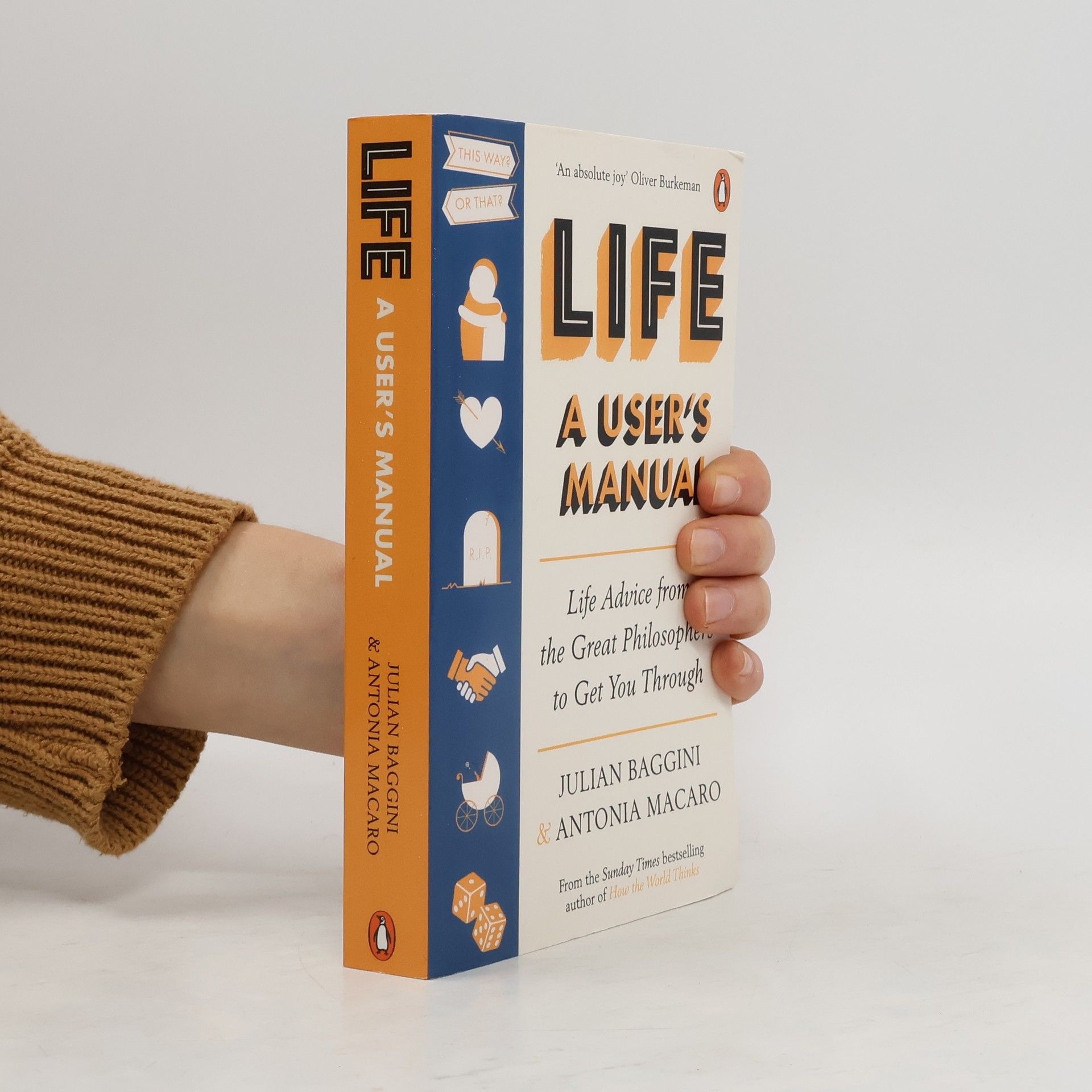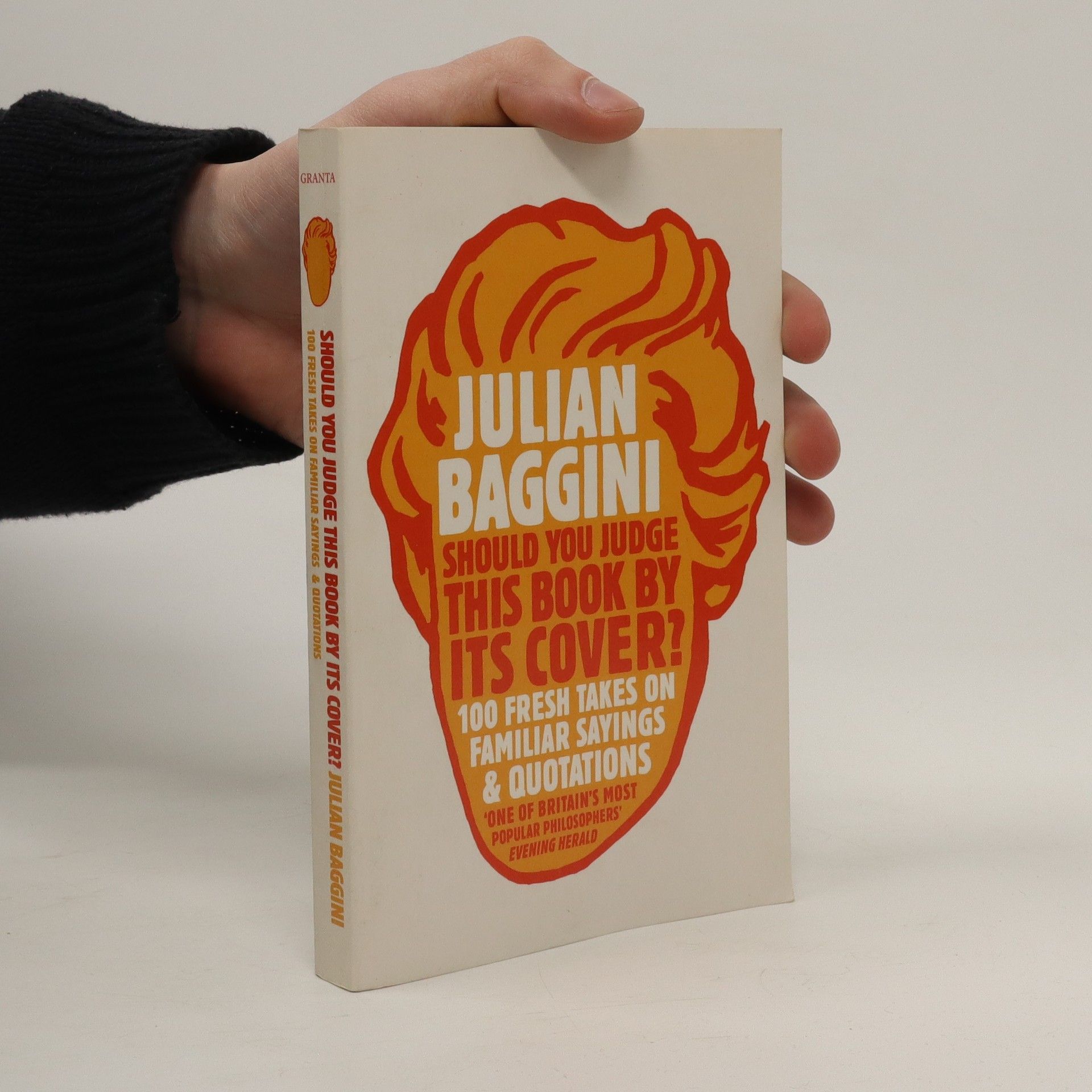On the face of it, Gabriel Axel's Babette's Feast (1989) is a film in which the eyes – and mouths – of religious zealots are opened to the glories of the sensual world. It is a critique of what Nietzsche called life-denying religion in favour of life-affirming sensuality. But to view the film in that way is to get it profoundly wrong. In his study of the film, Julian Baggini argues that Babette's Feast is not about the battle between religiosity and secularity but a deep examination of how the two can come together. Baggini's analysis focuses on themes of love, pleasure, artisty and grace, to provide a rich philosophical reading of this most sensual of films.
Julian Baggini Knihy
Julian Baggini je britský filozof známý svými knihami o filozofii pro širokou veřejnost. Jeho práce se zabývá složitými filozofickými myšlenkami a prezentuje je přístupným způsobem. Baggini je také spoluzakladatelem a redaktorem The Philosophers' Magazine a často přispívá do předních britských médií. Jeho přístup spočívá v používání myšlenkových experimentů k prozkoumání klíčových filozofických otázek, čímž čtenáře aktivně zapojuje do filozofického myšlení.






The Ethics Toolkit provides an accessible and engaging compendium of concepts, theories, and strategies that encourage students and advanced readers to think critically about ethics so that they can engage intelligently in ethical study, thought, and debate. Written by the authors of the popular The Philosophers' Toolkit (Blackwell, 2001); Baggini is also a renowned print and broadcast journalist, and a prolific author of popular philosophy books Uses clear and accessible language appropriate for use both inside and beyond the classroom Enlivened through the use of real-world and hypothetical examples Cross-referencing of entries helps to connect and contrast ideas Features lists of prominent ethics organizations and useful websites Encourages readers to think critically about ethics and teaches them how to engage intelligently in ethical study, thought, and debate
30-second philosophies
- 160 stránek
- 6 hodin čtení
I Think Therefore I Am, Existentialism, Dialectical Materialism? The Socratic Method and Deconstruction? Sure, you know what they all mean. That is, you've certainly heard of them. But do you know enough about them to join a dinner party debate or dazzle the bar with your knowledge?30-Second Philsophies takes a revolutionary approach to getting a grip on the 50 most significant schools of philosophy. The book challenges leading thinkers to quit fretting about the meaning of meaning for a while and explain the most complex philosophical ideas - using nothing more than two pages, 300 words, and a metaphorical image. Here, in one unique volume, you have the chance to pick the potted brains of our leading philosophers and understand complex concepts such as Kant's Categorical Imperative without ending up in a darkened room with an ice pack on your head.
How we live is shaped by how we eat. You can see this in the vastly different approaches to growing, preparing and eating food around the world, such as the hunter-gatherer Hadza in Tanzania whose sustainable lifestyle is under threat in a crowded planet, or Western societies whose food is farmed or bred in vast intensive enterprises. And most of us now rely on a complex global food web of production, distribution, consumption and disposal, which is now contending with unprecedented challenges.The need for a better understanding of how we feed ourselves has never been more urgent. In this wide-ranging and definitive book, philosopher Julian Baggini expertly delves into the best and worst food practises in a huge array of different societies, past and present. His exploration takes him from cutting-edge technologies, such as new farming methods, cultured meat, GM and astronaut food, to the ethics and health of ultra processed food and aquaculture, as he takes a forensic look at the effectiveness of our food governance, the difficulties of food wastage and the effects of commodification.Extracting essential principles to guide how we eat in the future, How the World Eats advocates for a pluralistic, humane, resourceful and equitable global food philosophy, so we can build a food system fit for the twenty-first century and beyond.
Life: A User's Manual
- 432 stránek
- 16 hodin čtení
How should I live? What is my purpose? Can I find happiness? Ever felt as though life would be simpler if it came with an instruction manual? There are no easy answers to the big questions. And life does not follow a straight path from A to B. Since the beginning of time, people have asked questions about how they should live and, from Ancient Greece to Japan, philosophers have attempted to solve these questions for us. The timeless wisdom that they offer can help us to find our own path. In this insightful, engaging book, renowned existential psychotherapist and philosophical counsellor Antonia Macaro and bestselling philosopher Julian Baggini cover topics such as bereavement, luck, free will and relationships, and guide us through what the greatest thinkers to ever walk the earth have to say on these subjects, from the Stoics to Sartre. Discover advice from the world's greatest thinkers on questions like: Is there a right way to grieve? What is free will? How can we learn from past mistakes? Do we make our own luck?
The Philosopher's Toolkit
- 376 stránek
- 14 hodin čtení
A new edition of the bestselling guide to the study of philosophy: the ideal intellectual ‘toolkit’ for sharpening analytical skills and building philosophical acuity Whether used as a guide to basic principles or a resource for key concepts and methods, The Philosopher's Toolkit equips readers with all the intellectual ‘tools’ necessary for engaging closely with philosophical argument and developing fluency in the methods and language of philosophical inquiry. Featuring accessible explanations, practical examples, and expert guidance, this text empowers readers to understand traditional philosophical thinking and to engage with new ideas. Focuses on the practical methods and concepts necessary for philosophical inquiry Presents a versatile resource for both novice and advanced students in areas of philosophy, critical theory, and rhetoric Adopts a pluralistic approach to teaching philosophy, making this a suitable resource for many courses Delivers extensive cross-referenced entries, recommended readings, and updated online resources Covers an array of topics, from basic tools of argumentation to sophisticated philosophical principles Fully revised and updated to include new topics and entries as well as expanded recommended reading lists to encourage further study
The Great Guide
- 328 stránek
- 12 hodin čtení
Invaluable wisdom on living a good life from one of the Enlightenment's greatest philosophers David Hume (1711–1776) is perhaps best known for his ideas about cause and effect and his criticisms of religion, but he is rarely thought of as a philosopher with practical wisdom to offer. Yet Hume's philosophy is grounded in an honest assessment of nature—human nature in particular. The Great Guide is an engaging and eye-opening account of how Hume's thought should serve as the basis for a complete approach to life. In this enthralling book, Julian Baggini masterfully interweaves biography with intellectual history and philosophy to give us a complete vision of Hume's guide to life. He follows Hume on his life's journey, literally walking in the great philosopher's footsteps as Baggini takes readers to the places that inspired Hume the most, from his family estate near the Scottish border to Paris, where, as an older man, he was warmly embraced by French society. Baggini shows how Hume put his philosophy into practice in a life that blended reason and passion, study and leisure, and relaxation and enjoyment. The Great Guide includes 145 Humean maxims for living well, on topics ranging from the meaning of success and the value of travel to friendship, facing death, identity, and the importance of leisure. This book shows how life is far richer with Hume as your guide.
How to Think Like a Philosopher: Essential Principles for Clearer Thinking
- 320 stránek
- 12 hodin čtení
As politics slides toward impulsivity, and outrage bests rationality, how can philosophy help us critically engage with the world? How to Think Like A Philosopher is a revelatory exploration of the methods, tenets and attitudes of thought that guide philosophy, and how they can be applied to our own lives. Drawing on decades of enquiry and a huge range of interviews, Julian Baggini identifies twelve key principles that promote incisive thinking. Pay attention; question everything; seek clarity, not certainty: these are just a few of philosophy's guiding maxims which can be applied to everything from understanding the impact of climate change to correctly appraising our own temperaments. Both a fresh introduction to philosophy covering canonical and contemporary philosophers, and an essential, practical guide to good thinking, How to Think Like a Philosopher shows us the way to a more humane, balanced and rational approach to thinking, to politics, and to life.
Do you think of atheists as immoral pessimists who live their lives without meaning, purpose, or values? Think again! Atheism: A Very Short Introduction sets out to dispel the myths that surround atheism and show how a life without religious belief can be positive, meaningful, and moral. schovat popis
Should you judge this book by its cover?
- 224 stránek
- 8 hodin čtení
This is a rapid-fire selection of short, stimulating and entertaining capsules of philosophy from Julian Baggini. Baggini applies his philosophical scalpel to famous sayings, proverbs and pieces of homespun wisdom in this book.

